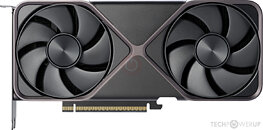- Joined
- Aug 19, 2017
- Messages
- 2,801 (1.02/day)
Thanks to some early 3D Mark benchmarks obtained by VideoCardz, NVIDIA's upcoming GeForce RTX 5070 Ti GPU paints an interesting picture of performance gains over the predecessor. Testing conducted with AMD's Ryzen 7 9800X3D processor and 48 GB of DDR5-6000 memory has provided the first glimpse into the card's capabilities. The new GPU demonstrates a 16.6% performance improvement over its predecessor, the RTX 4070 Ti SUPER. However, benchmark data shows it is falling short of the more expensive RTX 5080 by 13.2%, raising questions about the price-to-performance ratio given the $250 price difference between the two cards. Priced at $749 MSRP, the RTX 5070 Ti could be even pricier in retail channels at launch, especially with limited availability. The card's positioning becomes particularly interesting compared to the RTX 5080's $999 price point, which commands a 33% premium for its additional performance capabilities.
As a reminder, the RTX 5070 Ti boasts 8,960 CUDA cores, 280 texture units, 70 RT cores for ray tracing, and 280 tensor cores for AI computations, all supported by 16 GB of GDDR7 memory running at 28 Gbps effective speed across a 256-bit bus interface, resulting in an 896 GB/s bandwidth. We have to wait for proper reviews for the final performance conclusion, as synthetic benchmarks tell only part of the story. Modern gaming demands consideration of advanced features such as ray tracing and upscaling technologies, which can significantly impact real-world performance. The true test will come from comprehensive gaming benchmarks tested over various cases. The gaming community won't have to wait long for detailed analysis, as official reviews will be reportedly released in just a few days. Additional evaluations of non-MSRP versions should follow on February 20, the card's launch date.

View at TechPowerUp Main Site | Source
As a reminder, the RTX 5070 Ti boasts 8,960 CUDA cores, 280 texture units, 70 RT cores for ray tracing, and 280 tensor cores for AI computations, all supported by 16 GB of GDDR7 memory running at 28 Gbps effective speed across a 256-bit bus interface, resulting in an 896 GB/s bandwidth. We have to wait for proper reviews for the final performance conclusion, as synthetic benchmarks tell only part of the story. Modern gaming demands consideration of advanced features such as ray tracing and upscaling technologies, which can significantly impact real-world performance. The true test will come from comprehensive gaming benchmarks tested over various cases. The gaming community won't have to wait long for detailed analysis, as official reviews will be reportedly released in just a few days. Additional evaluations of non-MSRP versions should follow on February 20, the card's launch date.

View at TechPowerUp Main Site | Source








